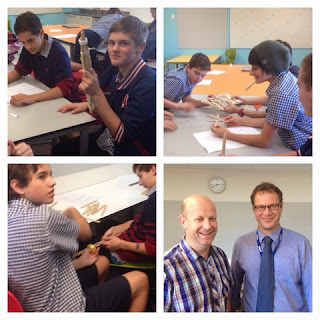Hacking their class - Take Action with Steve, Martin and Bryce
This term I have decided to set myself a new blogging project - highlighting the innovative, creative and best practice of others. Luckily, in working at HPSS I don't have to look far to find teachers shaking up the secondary curriculum in all kinds of ways.
Today's post looks at one our 'big modules' (three learning areas and teachers integrated in to a single module) call 'Take Action'. As many of you will be aware, we are a new school and as such only have Year 9s. The way our school year and curriculum is structured means students get to choose modules term by term. This helps to ensure that students can choose topics that interest them whilst we ensure all students are getting the coverage of threshold concepts and skills they will need to enjoy success when they meet NCEA.
'Take Action' is a module taught by Steve Mouldey, Bryce Clapham and Martin Basset, who respectively cover the following learning areas; Social Sciences, Physical Education and Technology. Covering the following learning objectives:
- To explore by considering perspectives on community issues.
- To generate by constructing a personal/social/technological issue.
- To refine by adjusting the action/product in response to feedback
In this module students will investigate the ways people can effect change in others and society. Students will then get the chance to take a social, physical or technological action on an issue in society that they are passionate about.
There are 64 students in this module who work with the three teachers all day long. The day is organised into three 90 minute blocks. The first block today was the first for the term and focused on setting up the expectations for the module for the term. Intended learning outcomes were explained and SOLO rubrics that would be used by students to scaffold their own progress were shared. Block two and three saw the group divided in two, with one group working with Bryce in gymnasium completing physical tasks in groups with leaders taking on different leadership styles - dictatorship, democracy, anarchy and monarchy. Whilst the other group completed a technology based bridge building challenge with team leaders adopting dictator, democratic or anarchic style. A great interplay of social sciences and PE and social sciences and technology respectively.
In talking to Steve and Martin about how the module and combination of learning areas came to be (teaching teams negotiate topics and who will team teach the integrated modules each term) as they said "it was a no brainer". Technology, social studies and health and physical action are central to the notion of citizenship. Citizenship being the umbrella concept that sits over all curriculum planning for Term 3. The social, physical technological actions the students will take in response to the societal issue they choose to focus on is where we see the three areas truly intersect. On talking to some of the students it was also this particular mix of learning areas that appealed to the learners. When asked why they chose this module over the other two many responded it was the specific mix of technology and social sciences that appealed. Having taught an integrated module myself last term it is becoming very clear that the integration of learning areas can really help to engage learners on a level that a single focus may not and that the combining of two or more learning areas can also provide authentic contexts for learning. I saw this when science learning provided a rich context for my teaching of writing and similarly I saw it here today with a technology task giving an authentic context for teaching a social science concept.
I look forward to checking back in this module later in the term, in the mean time you can keep an eye in Steve's blog as I have no doubt he will be sharing along the way.



Comments
Post a Comment